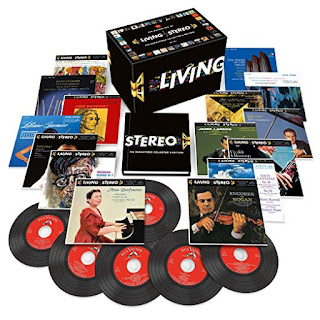Decca SXL 6119: Ansermet conducts Russian Delights


Russian Delights
L'Orchestre de la Suisse Romande
Ernest Ansermet, conductor
Pressing: UK, ED2
Date first published: 1964
Stampers: ZAL-6319-2E, ZAL-6320-2L
Mother number: 1, 1
Buckingham codes: I, BB
Performance: 8.5/10
Sound: 8.5/10
Price Range: $24-366 (mean $92) on popsike.com
Comments: Here is another enjoyable potpourri of Russian orchestral favorites by Mussorgsky and Glinka. Although this LP doesn't usually make it to the well-known audiophile recording lists, it is, in my humble opinion, a gem and certainly one of my favorite London/Decca's. Night on the Bare Mountain may drag a bit in terms of tempo and doesn't have quite the terror of contemporaneous recordings by Matacic, Giulini, Leibowitz, or Pretre, but Ansermet and the OSR still manage to maintain a decent level of intensity throughout. The movements from "Khovanschchina" are sensitively played, though, I have honestly never been particularly drawn to this work. The Overture to Russlan and Ludmilla, Waltz Fantasy, and Jota Aragonesa are more successful and a delight to listen to from start to finish.
There is much to praise about the sonics of this recording. The orchestra is presented with mostly excellent clarity (there is just a touch of very low-level distortion at times), imaging, and transparency across a wide and expansive soundstage. Dynamics are certainly a strong point of this album and, combined with the deep bass (most notable with the percussion), give powerful impact to the more dynamic musical passages.
This LP shows up about 9-10 times per year on the auction market, which is relatively rare for a Decca, though based on the most recent going prices it doesn't look like you'll have to break the bank to get a decent copy. That being said, a NM copy just sold for $227 earlier this month. The London version of this recording, CS 6405, is generally cheaper and may be the copy to seek, unless you have to have the more colorful laminated Decca cover.
Stampers: ZAL-6319-2E, ZAL-6320-2L
Mother number: 1, 1
Buckingham codes: I, BB
Performance: 8.5/10
Sound: 8.5/10
Price Range: $24-366 (mean $92) on popsike.com
Comments: Here is another enjoyable potpourri of Russian orchestral favorites by Mussorgsky and Glinka. Although this LP doesn't usually make it to the well-known audiophile recording lists, it is, in my humble opinion, a gem and certainly one of my favorite London/Decca's. Night on the Bare Mountain may drag a bit in terms of tempo and doesn't have quite the terror of contemporaneous recordings by Matacic, Giulini, Leibowitz, or Pretre, but Ansermet and the OSR still manage to maintain a decent level of intensity throughout. The movements from "Khovanschchina" are sensitively played, though, I have honestly never been particularly drawn to this work. The Overture to Russlan and Ludmilla, Waltz Fantasy, and Jota Aragonesa are more successful and a delight to listen to from start to finish.
There is much to praise about the sonics of this recording. The orchestra is presented with mostly excellent clarity (there is just a touch of very low-level distortion at times), imaging, and transparency across a wide and expansive soundstage. Dynamics are certainly a strong point of this album and, combined with the deep bass (most notable with the percussion), give powerful impact to the more dynamic musical passages.
This LP shows up about 9-10 times per year on the auction market, which is relatively rare for a Decca, though based on the most recent going prices it doesn't look like you'll have to break the bank to get a decent copy. That being said, a NM copy just sold for $227 earlier this month. The London version of this recording, CS 6405, is generally cheaper and may be the copy to seek, unless you have to have the more colorful laminated Decca cover.





I'd like to hear this record and I might have a copy lurking around, but I suspect it may not be a great pressing. A NM London CS6405 is on ebay for $10 right now, but be sure to ask the seller the stamper numbers or if it is a "grooved" pressing (the seller may have a later pressing and is not showing the label for this reason, but a later British pressing might also be fine) . The grooved pressing should be comparable to the record under review. Both the Decca and London came out around November/December 1964 and I'd bet the Decca might be marginally superior though both probably have the same mother and so should be close.
ReplyDeleteI'll add from my own study of the later bluebacks this is not a full tube blueback. These near misses can sound pretty good, but they won't do the special things that tube recordings do and especially some of the better later bluebacks. This is muddied by the label approach on Decca which uses this label for four more years or so. The original recording was from May of 1964. Some of the low level distortion Aqlam mentions may be due to a number of early transistor devices in the signal path (which aren't the end of the world as discrete transistor circuits are often preferred to the modern integrated circuit (IC) for sound.
ReplyDelete